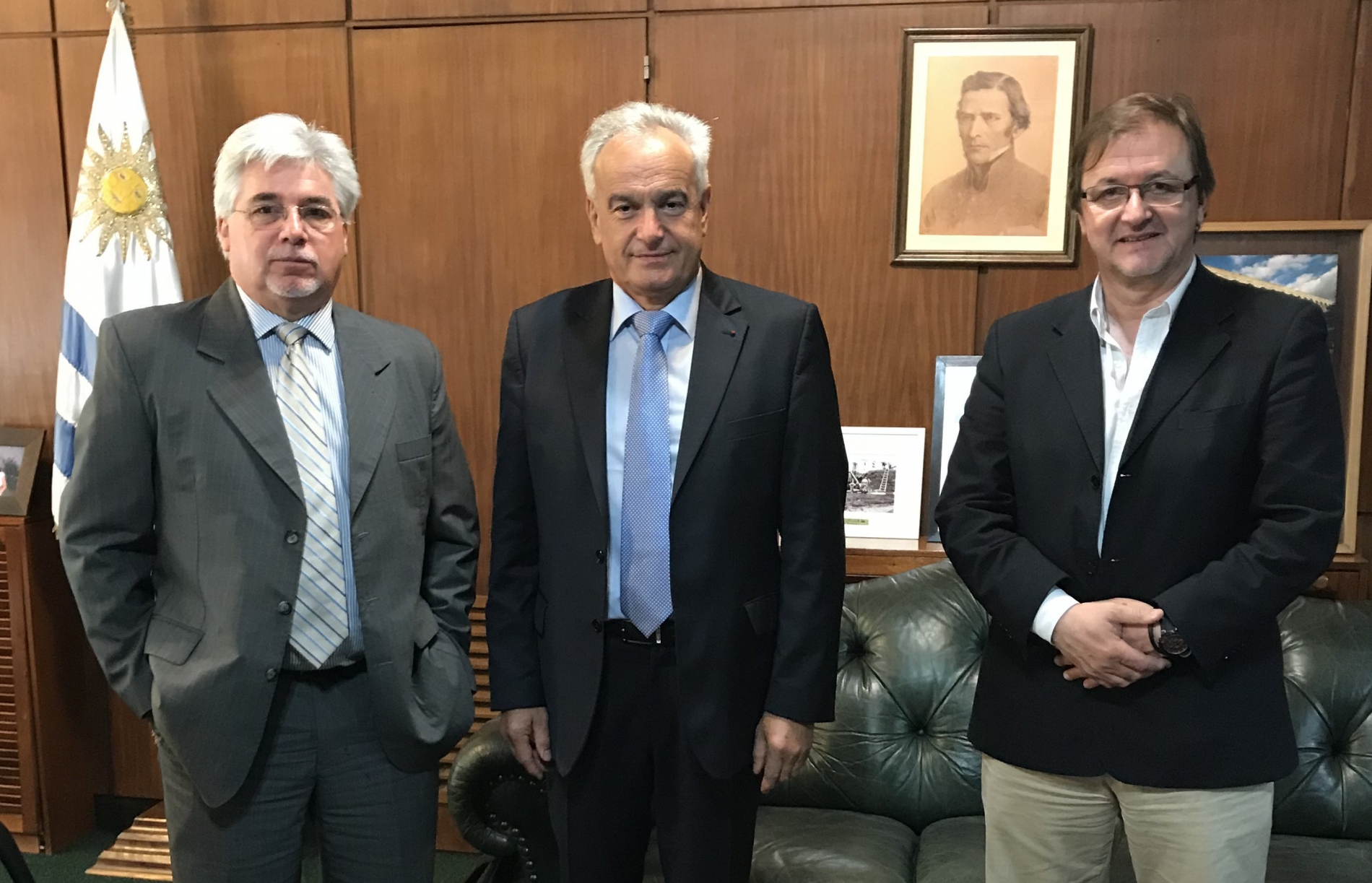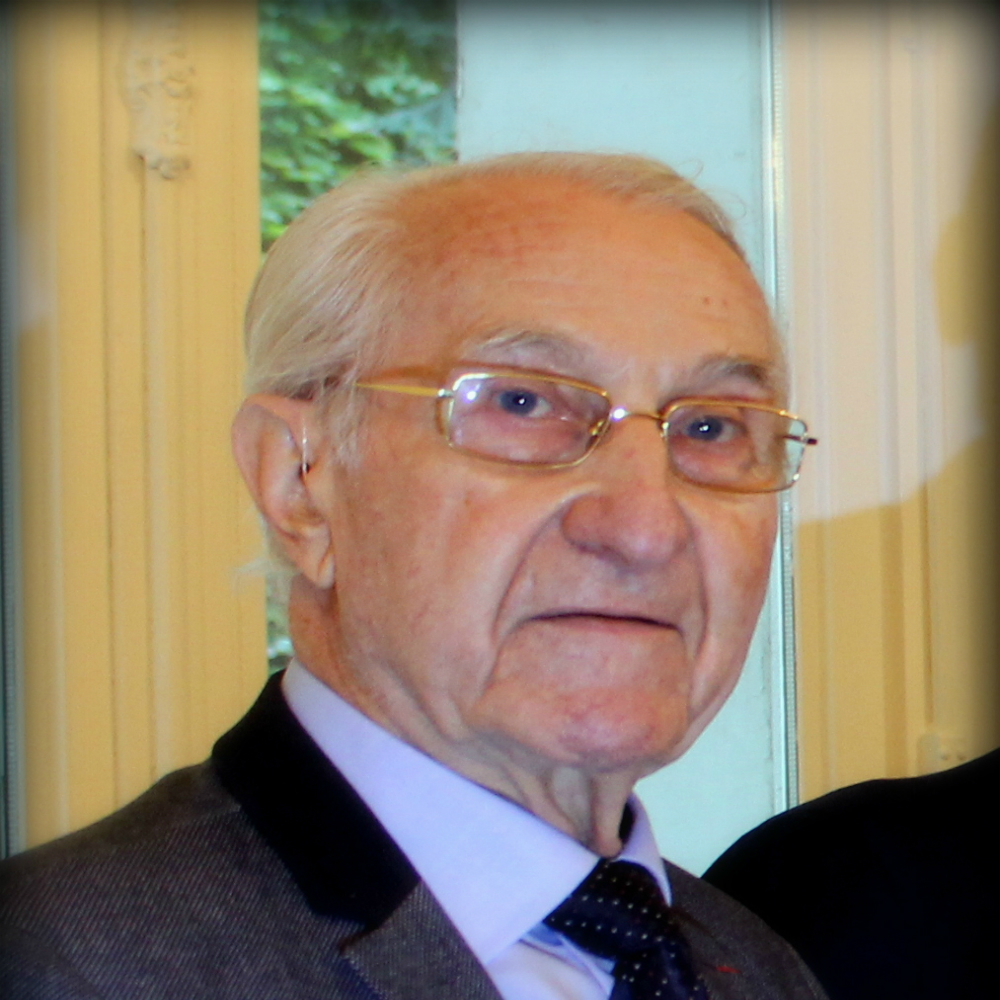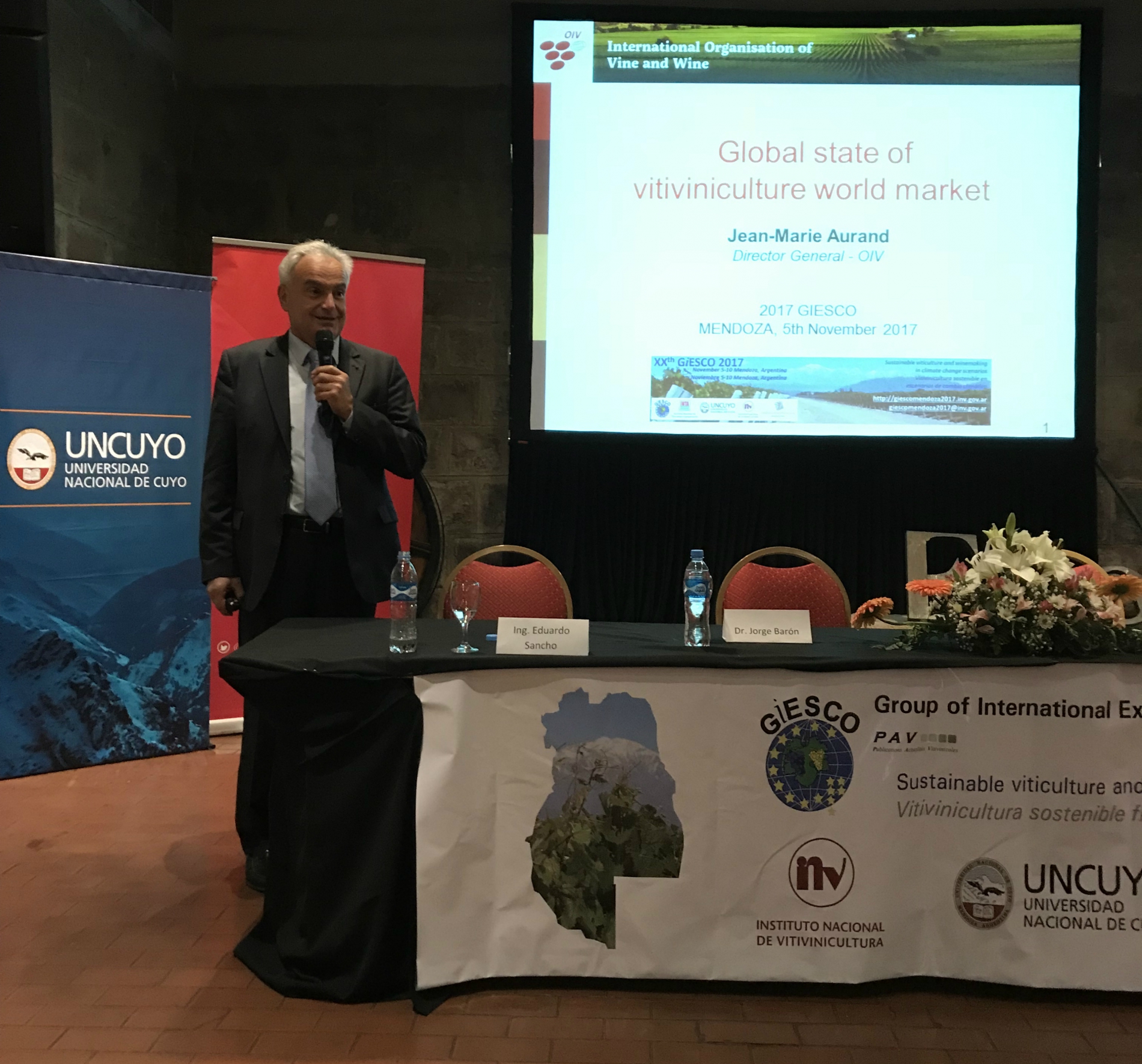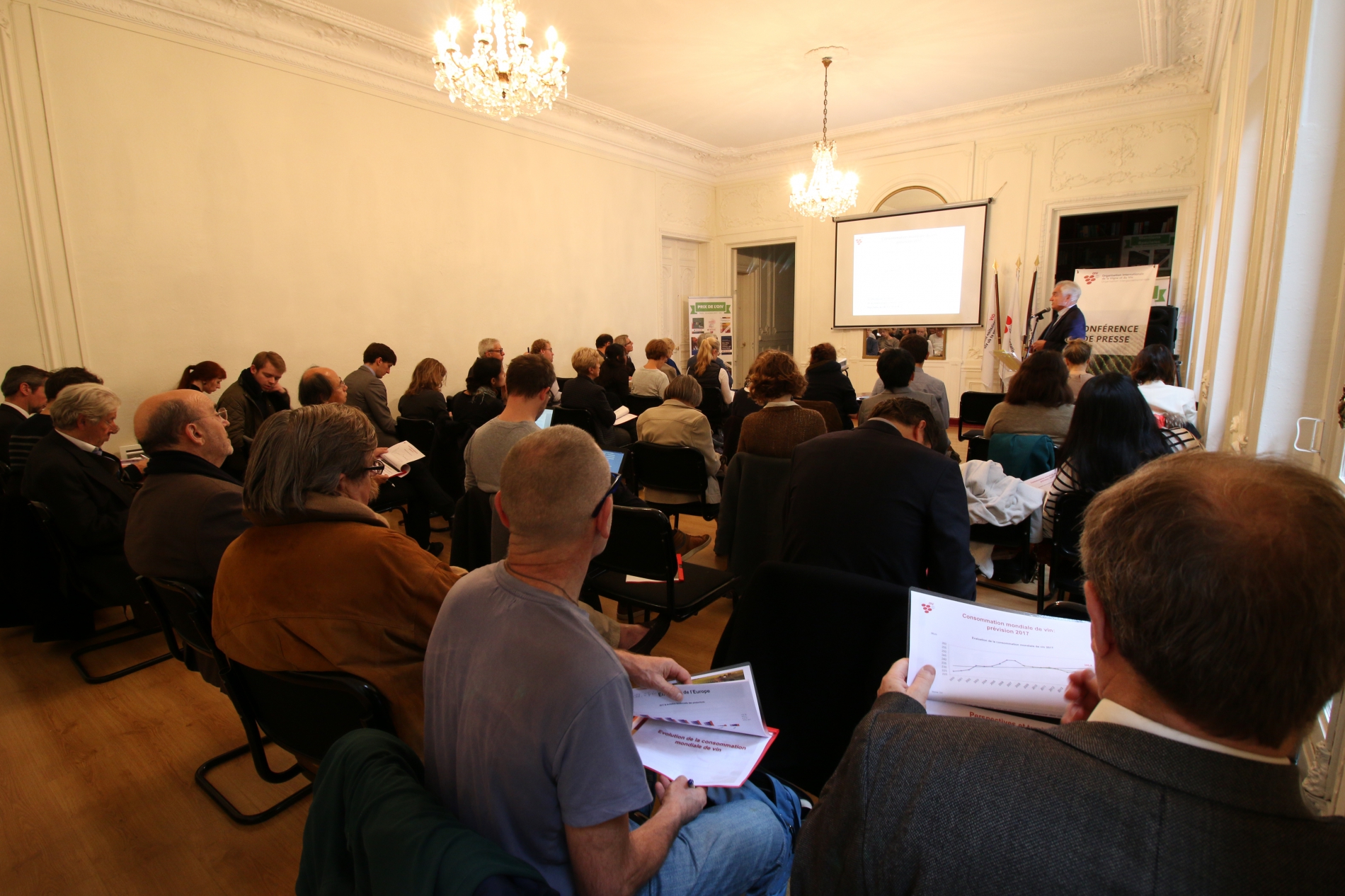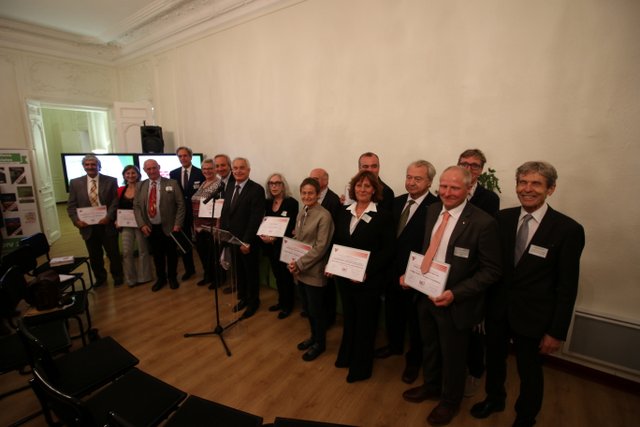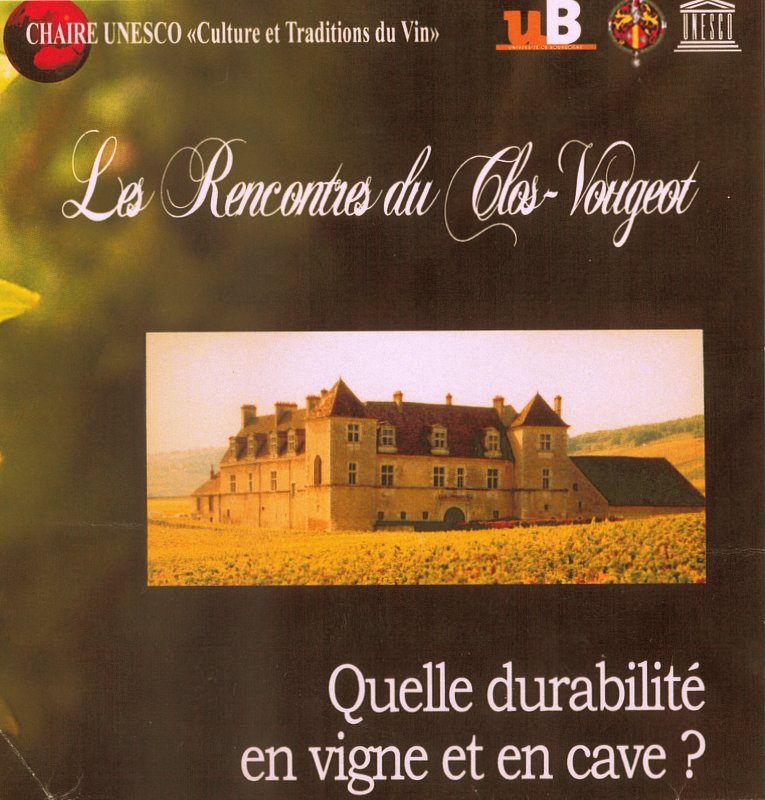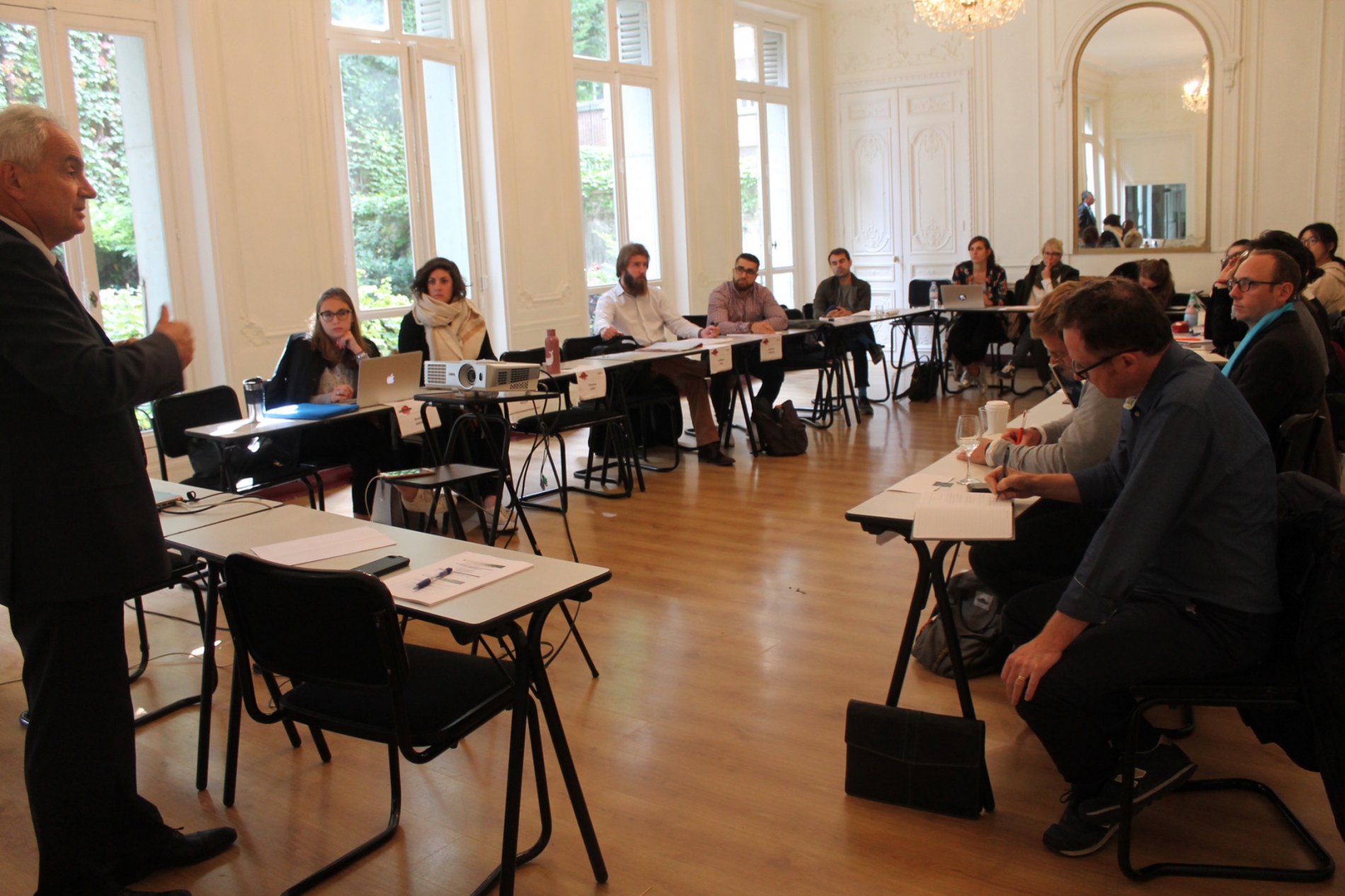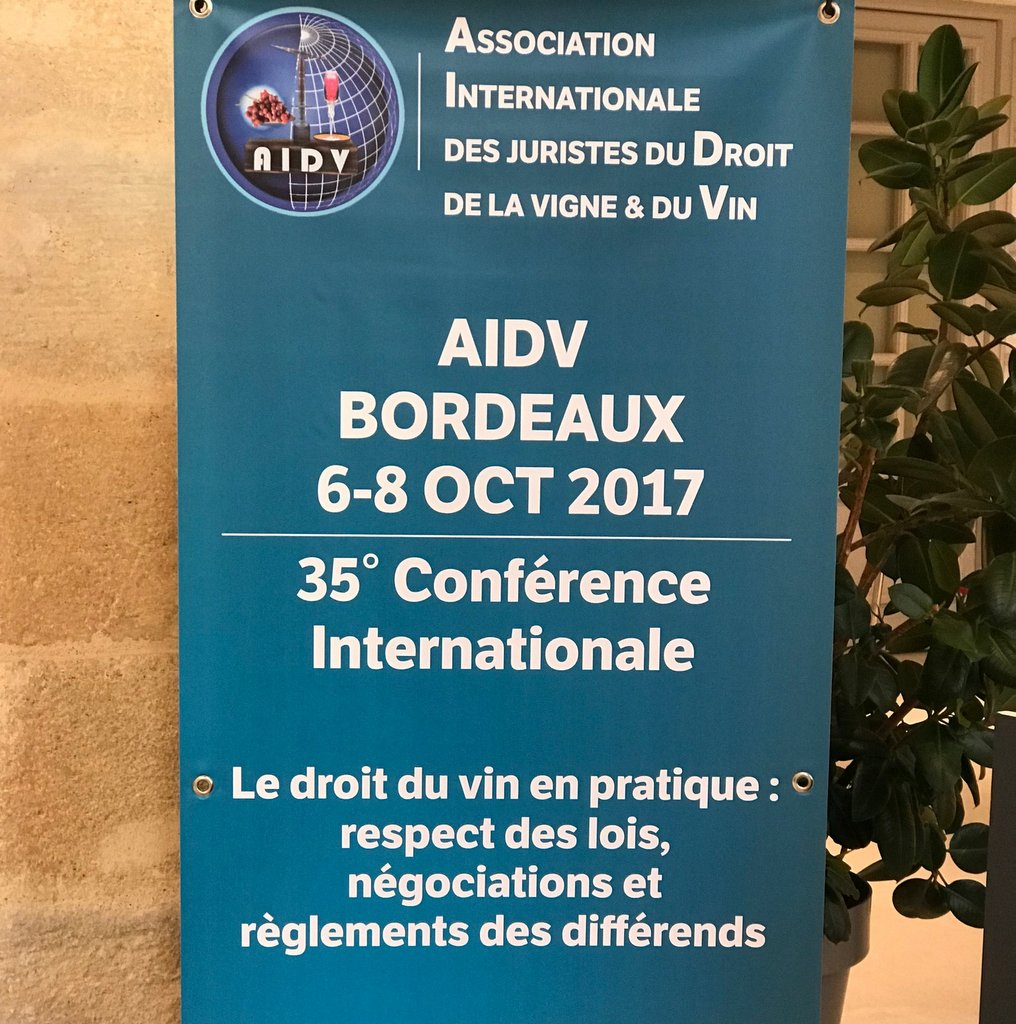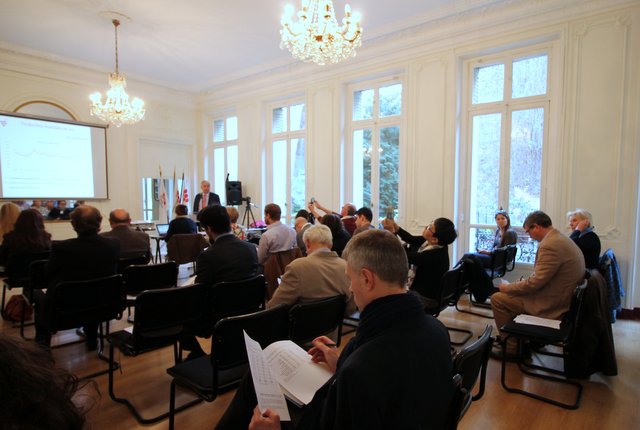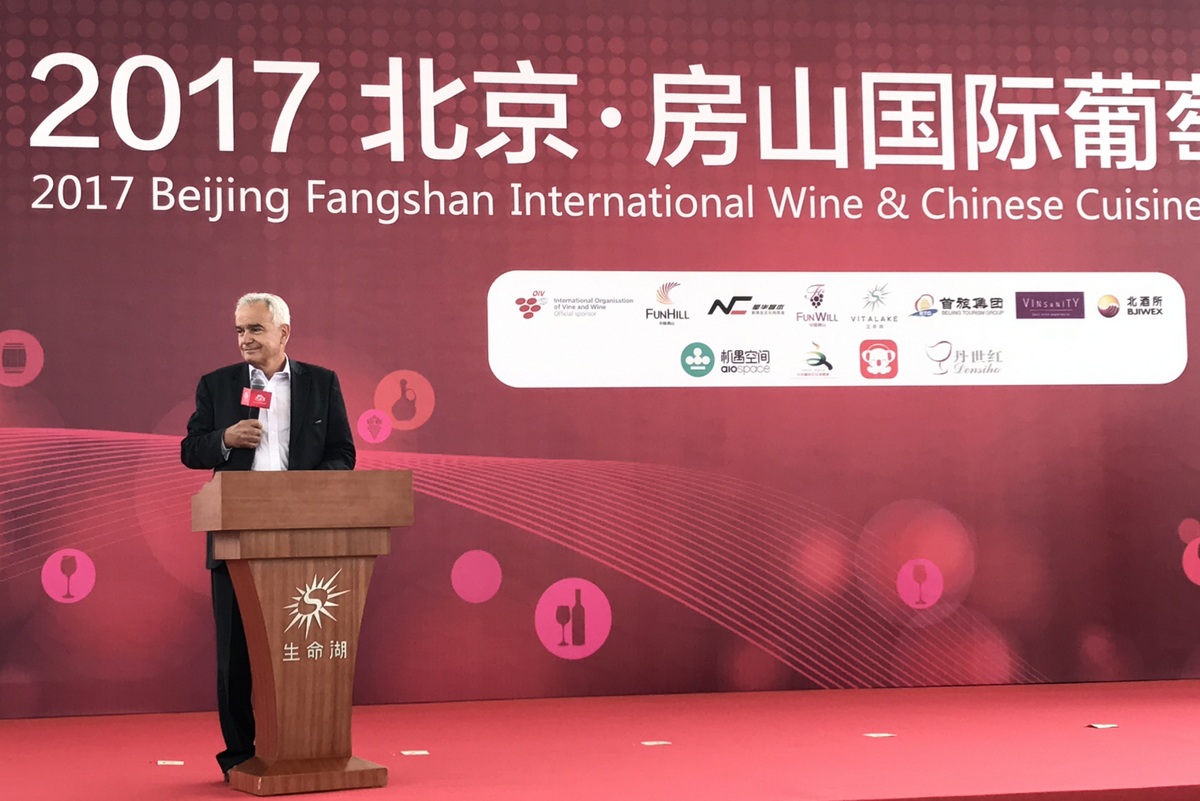14 ноя 2017
This will take place in Punta del Este on 19-23 November 2018, on the general theme of "Shaping the Future: Production and Market Challenges".The Uruguayan Minister for Agriculture, Mr Tabaré Aguerre, confirmed his country's full commitment to the success of this event.Jean-Marie Aurand, after paying a visit to the location where the Congress is set to take place, expressed his great satisfaction with the way in which the various actors involved are mobilising more than a year in advance, and especially with the high level of involvement of the INAVI (National Institute of Vitiviniculture).Tabaré Aguerre, Jean-Marie Aurand and José Lez Secchi
12 ноя 2017
One month ago, at the OIV headquarters, he was celebrating the 30th anniversary of the OIV Master's in Wine Management that he founded, surrounded by two generations of former students.A graduate of the Paris Law Faculty and the research and development centre of the Department of Fraud Control, he began his career as General Counsel for the National Department of Control for Wines and Spirits (1964-1970), then as head of the bureau of wines and beverages at the Ministry of Agriculture (1970-1981).Inspector General for Fraud Control, he was appointed by France as Commissioner-General to organise the OIV general assemblies in Paris in 1975 and 1982, for which he was the spokesperson for issues relating to designations of origin and wine quality. From 1982 to 1985, he presided the OIV "Regulation and Quality Control" Expert Group.His legal competencies and knowledge of the vitivinicultural sector paved the way to his presidency of the "Wine" Group (1979) and "Spirituous Beverages" Group (1984) at the Council of Ministers of the European Union, his participation in the revision of the Paris Convention with the WIPO, his vice-presidency of the FAO Wine Group (1983) and his leadership of the French delegation to the Codex Alimentarius Commission.After becoming Deputy Director of Consumption and Fraud Control, in 1985 he was elected OIV Director General and occupied the post until 1996, developing the activities of the Organisation, which grew from 33 Member States to 46 during this period.After becoming Deputy Director of Consumption and Fraud Control, in 1985 he was elected OIV Director General and occupied the post until 1996, developing the activities of the Organisation, which grew from 33 Member States to 46 during this periodPassionate about history and wine law, and proud of his Burgundy origins, he created the first wine law course in 1971 and loved sharing his passion with students in oenology, economy, agronomy or law at numerous French universities. This is how he came to be at the heart of the initiative to create the International Wine Law Association (IWLA) in 1987 and the International University Association of Wine (AUIV), which took charge of the OIV Master's in Wine Management.For 20 years, he continued to share his skills as part of the IWLA, as part of the Académie Amorim over which he presided and with the UNESCO Chair "Culture and Traditions of Wine" at the University of Burgundy.A great diplomat, he leaves us with the memory of a passionate and inventive OIV Director dedicated to the service of the world of vine and wine that he knew so well.The OIV pays tribute to his memory and would like to extend its deepest sympathies to his family.
08 ноя 2017
More than 250 experts from around the world (over 20 countries represented) took part in the different sessions of this conference, which was dedicated in particular to the sustainability of viticulture in the different scenarios of climate change.At the opening of the forum placed under the patronage of the OIV, the Vice-President of the Organisation, Claudia Quini, gave a presentation of Argentine vitiviniculture on behalf of the INV (Argentine National Vitiviniculture Institute).The OIV Director General, Jean-Marie Aurand, gave a panorama of the vitivinicultural sector at the global level, as well as the major trends and main issues, highlighting the role of the OIV in this context.The GiESCO Association brings together experts in vitivinicultural systems. Originally focused on vineyard training systems and ecophysiology, the work of this group of experts has expanded to include the key issues of fundamental and applied viticulture.
23 окт 2017
During the press conference held at the headquarters of the International Organisation of Vine and Wine, the Director General of the OIV, Jean-Marie Aurand, presented initial information about world wine production in 2017.
- Very low production in Europe: production levels were at a historic low in Italy (39.3 mhl), France (36.7 mhl) and Spain (33.5 mhl).
- An even higher level of production was recorded in the United States (23.3 mhl).
- South Africa (10.8 mhl) maintained its level of production.
- In South America, production increased compared with the low levels of 2016, particularly in Argentina (11.8 mhl) and Brazil (3.4 mhl). In Chile (9.5 mhl), vinified production remained low.
- Australian production (13.9 mhl) grew and New Zealand production (2.9 mhl) maintained a very good level despite a slight decline
16 окт 2017
Present were multiple members of the Diplomatic body of the OIV including the President of the OIV Mrs. Monika Christmann, the Director General of the OIV Mr. Jean-Marie Aurand, the President of the OIV Awards Jury Mr. František Lipka, as well as the Scientific Secretary of the OIV Awards Mr. Jean-Luc Berger.They were joined by distinguished members of the world of wine at one of the key events in the OIV calendar including representatives from publishing houses, journalists, vitivinicultural professionals and OIV Experts…The growing success of this ‘Nobel Prize of vitivinicultural literature’ (Jean-Marie Aurand, Director General of the OIV) aims to offer current and diverse information on Vine and Wine to readers. This is spread across different subjects, technical and scientific (œnology and viticulture), economy and law, history, literature and fine arts, wine and health, wine and gastronomy, as well as the presentation of wines and the viticultural regions throughout the continents.The rigorous selection of all the works, by the specialised evaluators from around the world, allowed for the International Jury, presided by Mr. František Lipka, to make an impartial selection from 65 submissions from 19 countries. The prizes with 10 OIV Awards and 8 Special mentions represent original works of immense quality on the cutting edge of the latest technological advances and scientific discoveries.The quality and depth of the works in the 2017 OIV Awards are confirmation of the prestige of the OIV Awards and their standing in the vitivinicultural world. The works cover the entire vitivinicultural world including regions where vitivinicultural is not well known as well as countries that are not curently member states of the OIV.2017 AwardsOIV Awards 2017Special Mentions 2017
11 окт 2017
Held over three days in the heart of the Burgundy vineyards, this event brings together different actors in the vitivinicultural world (academics, researchers, vine growers, merchants, etc.) to reflect on a particular theme. In 2017, this theme was sustainability in the vineyards and the winery, and several dozen participants took part over the three days, with foreign speakers being well represented.At the invitation of the Head of the UNESCO Chair, Jocelyne Pérard, the OIV Director General closed the conference. On this occasion, Jean-Marie Aurand presented the OIV's activities related to sustainability, carried out through a new holistic approach first implemented in 2015.It should be noted that the UNESCO Chair of the University of Burgundy made the application to include Burgundy vineyards on the World Heritage of Humanity list of natural and cultural sites, as viticultural sites. This recognition was granted in 2015.There are 15 or so sites around the world associated with viticulture that have achieved this recognition. They are an illustration of the human activity, through the mark they leave on the land and through the cultural traditions with which they are associated.
08 окт 2017
After an introduction to the OIV and its activities by the different unit heads, they were welcomed by Director General Jean-Marie Aurand, who emphasised the distinctive character of this training programme and the opportunities it offers, thanks to the network of associated universities and companies.The specific nature of the course is designed to be mono-sectoral, multi-disciplinary, itinerant, international and experiential all at the same time; it also now has one of the most developed networks in the world of wine. Since 1987, almost 500 players and policy makers in the wine world have taken this training programme.Before this year's class left the OIV headquarters, Jean-Marie Aurand stressed the course's international dimension, which is expressed through a curriculum that every year leads students to discover over 20 key countries on the wine planet, spread over the 5 continents.On this 30th academic year, the OIV MSc in Wine Management will celebrate its 30th anniversary on Friday 13 October at the OIV headquarters with a special conference and tasting day.
05 окт 2017
At the invitation of the Bordeaux city council, the Bordeaux Wine Council (CIVB) and the Council for the Grands Crus Classés in 1855, the experts specialised in wine law discussed the theme of “Wine law in practice: compliance, negotiation and dispute settlement”.As the vine and wine sector has become global, a specific branch of law has thus developed around it and this relies upon the international expertise assured by the IWLA (International Wine Law Association), its members and its network.The German solicitor Thomas Schmitz, President of the IWLA, likes to believe that Montesquieu (a magistrate and vine grower, undoubtedly one of the first legal experts in wine who was, in his time, opposed to restrictions on planting) would have particularly appreciated the subject matter. The theme allowed for discussions on alternative methods for conflict resolution and the implementation of viticultural controls where, for the first time, a panel of French, Australian and Canadian judges can compare the methods for assessing the validity of evidence.On the 30th anniversary of the first conference held in Champagne in 1987, the Director of the Council for the Grands Crus Classés in 1855 and active member of the IWLA, Sylvain Boivert, hosted the two days of the conference at the Palais de la Bourse. He expressed his delight that – following Tuscany in 2016 and prior to Napa Valley the coming year – Bordeaux was able to welcome the elite of the world of wine law for these annual meetings that saw unparalleled success in 2017, pairing legal expertise with the attractiveness of Bordeaux and the art of playing host to several Grands Crus Classés.With a Master in Vine and Wine Law from Bordeaux, Sylvain Boivert was also appreciative of the opening up of the IWLA, which enabled around 50 Master's students in Wine Law from the Universities of Bordeaux and Reims to attend this conference for free and thus meet the top international experts in the field.As emphasised by the IWLA Secretary General, Yann Juban, legal expert and Assistant to the Director General of the OIV (who placed this conference under its patronage), "following the creation of oenological science in the 19th century and the development of global vineyards after the phylloxera crisis in the 20th century, an area of law truly specific to vine and wine was put in place, at the national, regional and international levels". To quote Montesquieu, he specified that the following also applies to vitiviniculture: "useless laws weaken necessary laws".-------------------The IWLA (International Wine Law Association) was founded in 1985 by European and American legal experts, with the aim of creating a forum for research and discussion on legal issues concerning the viticultural community and wine trade around the world. Today the IWLA is composed of over 300 members, individual and institutional, originating from 30 countries spread over 5 continents. The IWLA seeks to involve the competent authorities in its work in order to keep them informed of vitivinicultural law in other countries and to thus contribute to the sector's evolution in terms of harmonisation at the international level, particularly through its observer status at the OIV (International Organisation of Vine and Wine) and WIPO (World Intellectual Property Organization).The IWLA's members include lawyers, judges, civil servants, notaries, university law professors, students, heads of companies or professional organisations, and associations. The IWLA deals with issues related to rural law, intellectual property and counterfeiting, contracts, trade, economic law and fraud, publicity, the environment, jurisprudence, disputes, arbitration and all other legal matters that apply to the vine and wine sector, from a comparative and international perspective.www.aidv.org
24 сен 2017
To attend this press conference, journalists are kindly asked to send an email with their name and their professional contact details to press@oiv.int.Date: Tuesday 24 October 2017Time: 11 amLocation: International Organisation of Vine and Wine, (OIV), 18 Rue d'Aguesseau, Paris 75008 - Metro station Madeleine or Concorde [see map]
17 сен 2017
On 13-17 September, the first International Wine and Chinese Food Forum was held in Fangshan, near to Beijing.Placed under the patronage of the OIV, the aim of this event was to promote wine in China paired with Chinese cuisine.Around 20 experts (sommeliers, masters of wine, top chefs and specialist journalists), a third of whom were from other countries, selected the best pairings from a dozen or so traditional Chinese dishes and wine samples chosen out of 300 wines from around the world. Also on the programme was an international wine exhibition as well as a conference series on the theme of 'wine and culture'.On 13-17 September, the first International Wine and Chinese Food Forum was held in Fangshan, near to Beijing.Organised with the support of around 20 vitivinicultural companies from Fangshan District and the District government, this event brought together several thousand participants.On this occasion, the Director General of the OIV, after a presentation of the Organisation, issued a panorama of the vitivinicultural sector at the global scale and the main issues for the future – with a particular focus on different approaches for promoting vitiviniculture through its historical and cultural dimensions.During this visit, in Beijing, Jean-Marie Aurand met Mr Qu Dongyu, Vice-Minister for Agriculture in charge of international cooperation, and was received by Mr Bian Zhenhu, President of the China Chamber of Commerce of Import and Export of Foodstuffs and Native Produce (CFNA), which is linked to the Chinese Ministry of Commerce. With Mr Qu Dongyu, Vice-Minister for Agriculture in charge of international cooperationWith Mr Bian Zhenhu, President of the China Chamber of Commerce of Import and Export of Foodstuffs and Native ProduceThe Director General praised the development of relations between China and the OIV, particularly with regions that have observer status (Yantai in Shandong and Ningxia) but also with the Enology faculty of the University in Yangling.The OIV has received a growing number of requests from all of the Chinese wine regions at a time when the Chinese vitivinicultural sector is seeing strong growth.Jean-Marie Aurand expressed to those with whom he spoke the wish for this cooperation to result in the full accession of China to the OIV.With a surface area of 875 000 hectares, 85% of which are destined for table-grape production, China has the 2nd largest area under vines in the world. China is the leader among producing and consuming countries for table grapes. Wine production has reached 11.5 million hectolitres – placing it 8th in the world – and consumption 17 million hectolitres, making China the 5th biggest consumer.
